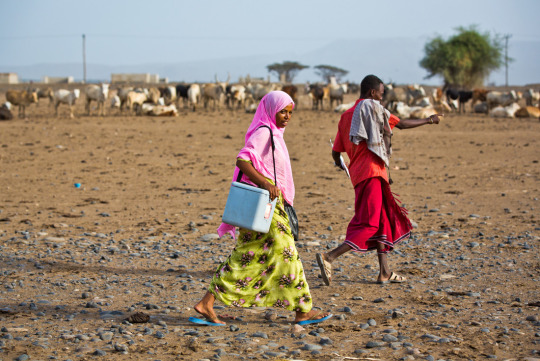Rachael Hore, Gavi
What does it take to get people to claim their right to protection against deadly diseases? The answer is as varied as the people in question. In Afar, Ethiopia, actors, singers and dancers are all part of innovative efforts to help families in this rural community demand the vaccinations their children deserve just as much as youngsters living elsewhere.

Community members celebrate the arrival of ministry of health and immunisation partners during African Vaccination week. Photo: M. Gebreyesus.
In Afar, the average vaccine coverage rate is 25% (dropping to 12% in some areas), in contrast to 94% in the capital, Addis Ababa (DHS 2012). The reason for this inequity isn’t that vaccines are in short supply. Instead, difficult geography and traditional nomadic lifestyles combine with a lack of vaccine information to cause low demand for immunisation. This means that helping local people to advocate for vaccines from within the community is key to increasing demand and immunising every child. Addressing a lack of demand focuses on five main areas: cultural or religious beliefs, lack of information, fears of risk, accessibility (inadequate supply, hard to reach location) and trust in health workers.

Vaccines being transported by camel in Afar. Photo: M. Gebreyesus.
Increasing demand for vaccines in Afar will rely on social mobilisation committees who will identify key gaps, propose major activities and prepare action plans relevant to their communities. Led by the heads of local government, these committees were originally established in pastoralist regions to improve community participation in health programs. Reflecting the people they want to reach, other key committee members include health workers, political party representatives, teachers and leaders from women’s, youth and religious groups.
To help members understand key immunisation information and get essential communication skills, members of the two district and 18 local committees were given advocacy and orientation workshops earlier this year by PATH Ethiopia (with Gavi funding). Groups are already putting this training to use.

Participants at a workshop in August of this year, which was supported by Gavi and delivered by PATH. Photo: M. Gebreyesus.
At a local level, members of these committees will distribute information about vaccine preventable diseases through theatre and dance on market days, through schools, at regular women’s group meetings and at religious services. The idea is that these messages will then be adopted by the community, so women’s groups, for example, will incorporate vaccines into their general health and welfare sessions. This process will also give community members the chance to discuss barriers and issues around vaccines and service delivery, which committee members can report back to the district and regional levels at regular meetings. The feedback gathered from this project will help to inform similar initiatives focused on demand across the world.

Children get involved in promoting community awareness of vaccination. Photo: M. Gebreyesus.
Overall, it’s the community involvement that is setting the project up for sustainable success, explained Metchal Gebreyesus from PATH Ethiopia:
“A great motivator will be sharing successes and ideas between kebeles (wards) and districts – it generates a bit of healthy competition, especially if the most active and successful members report first because it sets the bar and the others want to match it.”
This approach has already resulted in vaccine progress. Religious leaders, Imams, advocate for immunisation during Friday prayers and encourage couples to vaccinate their future children during Nika, the marriage vows ceremony. In the communities where Imams began this work over a year ago, coverage rates for the basic package of childhood vaccines have already increased significantly.
The social mobilisation committees will build on this success, until communities understand and embrace the value of vaccination, and the parents of Afar demand it for every one of their children.






